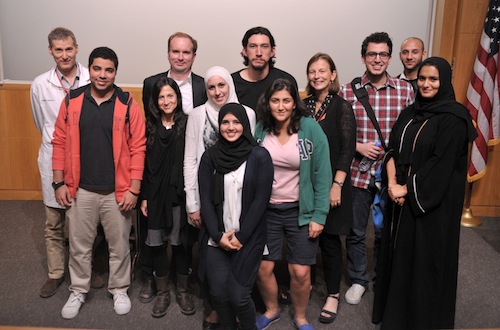Medicine studies converge with classic Greek literature
December, 2012

Adam Driver (center) and the cast of The Women of Trachis pose with audience
members and organiser Lyuba Konopasek.
Students, faculty and staff at WCMC-Q were introduced to an innovative stage program that integrates major themes in the classic Greek tragedies of Sophocles with the dilemmas of life, pain, death and suffering – often features in the daily working life of a physician.
The End of Life stage program was brought to WCMC-Q by Dr. Lyuba Konopasek, associate dean for medical education. It was designed by American director Bryan Doerries and performed by renowned US actor Adam Driver who performed a dramatic reading at WCMC-Q of scenes from one of Sophocles’ early tragedies, The Women of Trachis.
Sophocles was one of the most influential writers of Ancient Greece and the lesser-known Women of Trachis is described as an Athenian tragedy that deals with the harshness of life, love, suffering and pain.
“End of Life is a unique public health project that presents readings of Ancient Greek plays as a catalyst for general discussions about suffering and death as it touches patients, families, and health professionals who work in the fields of medicine, palliative care, geriatrics, nursing and clinical bioethics,” said Dr. Konopasek.
“This unique participatory event is intended to promote healthy discussion among diverse communities – public and professional – fostering compassion, cooperation and understanding about living with chronic suffering and the mortality we all share.”
Originally launched in 2006, by the Outside the Wire production company as an exercise to bring classical Greek drama to medical students with an opportunity for audience discussion and participation, it has since evolved into a program that uses live theatre to discuss many pressing issues in society like addiction, prejudice, torture, political violence, domestic abuse and ethical dilemmas like abortion or euthanasia.
The End of Life presentation has proved popular at public venues and schools across the U.S. and has been hosted at prestigious medical schools including Harvard and the Mayo Clinic. Prior to heading to Qatar, the show was performed before U.S. military personnel in Kuwait.
